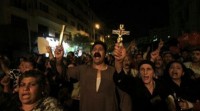Iran’s MAD strategy has a strategic rationale
My first book, The Iranian Islamic Revolution, published way back in 1986, dealt with the historicity of the 1979 Khomeinist Revolution in Iran. In it, I exposed the Khomeinist regime’s long-term ambitions and revisionist account of events that led to the Shah’s overthrow and Ayatollah Khomeini’s ascent to power in the alleged Islamic “Republic” of Iran.- Sunday, November 6, 2011

 The credibility of the Arab Spring took a bloody hit on Sunday October 9th when Egyptian Army forces shot dead more than thirty Christian Copts and wounded scores of them. In addition, the action by the Army was paralleled by armed men, described as Salafi Jihadists by Coptic sources, seen also shooting and hitting demonstrators with knives. At a few weeks from the legislative elections in Egypt, this violence impacts the debate about the Spring of Egypt but also challenges US and European policies towards the current and perhaps the forthcoming Government. Can the West support - and fund - a regime that kills members of the weakest community in Egypt, months after the fall of Mubarak?
The credibility of the Arab Spring took a bloody hit on Sunday October 9th when Egyptian Army forces shot dead more than thirty Christian Copts and wounded scores of them. In addition, the action by the Army was paralleled by armed men, described as Salafi Jihadists by Coptic sources, seen also shooting and hitting demonstrators with knives. At a few weeks from the legislative elections in Egypt, this violence impacts the debate about the Spring of Egypt but also challenges US and European policies towards the current and perhaps the forthcoming Government. Can the West support - and fund - a regime that kills members of the weakest community in Egypt, months after the fall of Mubarak?